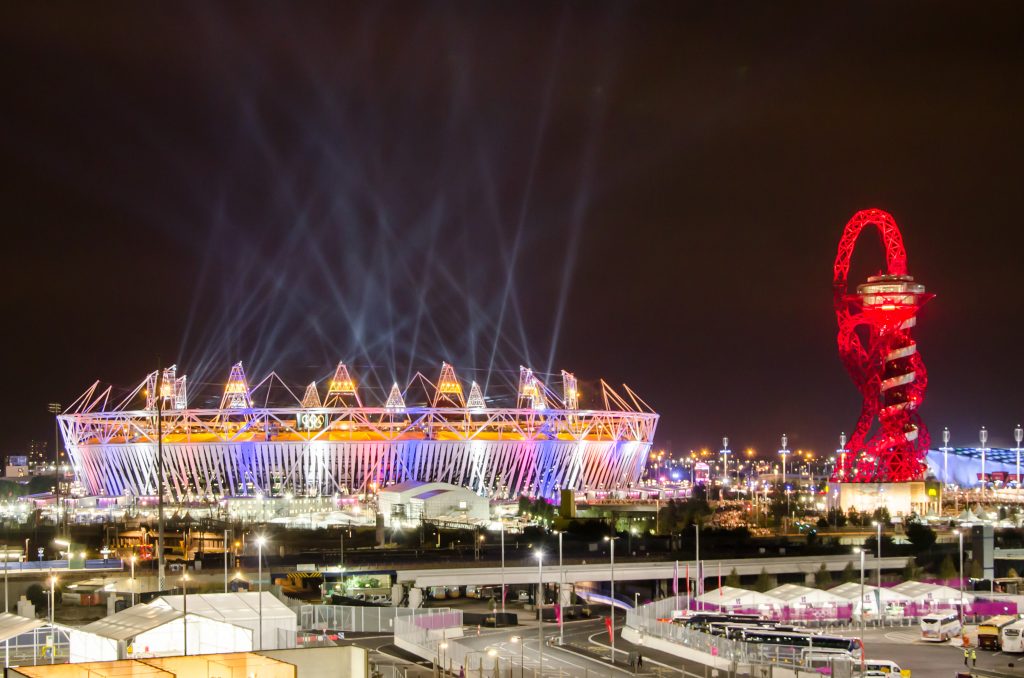How Milwaukee Could Have Hosted The 2028 Summer Olympics
New book by veteran radio broadcaster reveals how this dream could have become reality.

Olympic stadium and The Orbit during London Olympics opening ceremony. Photo by Alexander Kachkaev, (CC BY 2.0), via Wikimedia Commons
You’ll never be able to say Jay Sorgi doesn’t have big dreams.
The veteran sports radio personality has released a book, Greater Than The Games, that details his efforts to bring the 2028 Summer Olympics to Milwaukee and, with a substantial amount of detail, how things would actually work before, during and after.
“Launch a city, and heal it simultaneously,” wrote Sorgi of his vision for a city he said needs to embrace its history as “The Gathering Place.”
The vision called for 25 of the 39 venues to be within Milwaukee County, nine elsewhere in Wisconsin and five in Chicago. “The most compact plan for a game in almost 100 years,” says Sorgi, noting that every venue would be within two hours of the Olympic Village, in a preview of the book. The housing and stadium complex, Olympic Harbor, was to be built where Bay View meets the Harbor District, stretching along E. Bay Street from Barnacle Bud’s to the lake and connected to the rest of the “Lake Michigan Triangle” by a new rail system.
Greater Than The Games details how the first 10 days of the games would have worked, mixing an actual schedule of venues, events and logistics alongside stories of fictional athletes, volunteers and other participants. Sorgi himself features heavily as a character in the book, which serves both as a how-to guide and as a childhood memoir.
“Dreams born of childhood, that somehow reawaken in adulthood and not only become something that can define or launch a city, but perhaps help you understand yourself more than you ever thought you could even if the dream shouldn’t come to fruition,” said the Milwaukee native in a video explaining the vision, which he traces back to watching the 1984 Los Angeles games. A 22-year veteran of WTMJ, Sorgi relocated to Philadelphia with his family in 2021.
Each day includes logistics, like how no residents would be negatively displaced, transportation within the region and how the U.S. Olympic Committee would use the facilities as a long-term training ground. Venues, a mix of existing, improved and new facilities, would have been located in Milwaukee, Green Bay, Madison, Kohler and Chicago. Fiserv Forum, Lambeau Field and Camp Randall Stadium are all included, but smaller venues like Uihlein Soccer Park would have received massive expansions and the Baird Center would have been reconfigured.
The 354-page book offers conceptual plans about how venues could be financed, and how they could be repurposed afterward. A central stadium along E. Bay Street would hold up to 120,000 people and could allow for Green Bay Packers games, akin to the Packers play at Milwaukee County Stadium until the early 1990s. Smaller facilities, like a lakeside velodrome, could become a Trek production facility. Housing built for the games would become a racially and economically integrated community afterward.
“Even if the city can do it, should they do it?” asks Sorgi in the preview video. His book explores the pitfalls of past games, including broken promises, and how Milwaukee could overcome them.
A promised second volume is to cover the last nine days of the 19-day Summer Olympic Games.
Copies of “Greater Than The Games,” with a foreword by speedskater Bonnie Blair Cruikshank, are available on Amazon in Kindle and hardcover formats. The 2028 Summer Olympic Games were awarded to Los Angeles.
If you think stories like this are important, become a member of Urban Milwaukee and help support real, independent journalism. Plus you get some cool added benefits.





















This is one of the stranger vanity projects I’ve seen a news outlet cover.